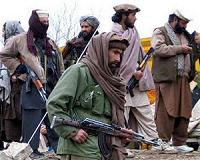| . |  |
. |
Brussels (AFP) Feb 1, 2011 NATO's military might will never win the war against Afghanistan's heroin trade alone, an Afghan judge said, urging the alliance to put more energy into weaning farmers off opium poppy crops. Afghanistan's primary court of counter narcotics in Kabul has handled more than 2,000 cases in the past four years, said Hayatullah Ahadyar, one of the six judges who sit on the court that oversees big drug busts. "We do not have to always use force, capture people, put them in jail. We have to have alternatives for farmers," he said. "How many people should we capture and put in jail? Maybe nobody will be left in Afghanistan, everyone will be in jail," he told AFP in an interview ahead of a meeting with NATO officials in Brussels on Monday. Despite raids against drug facilities and eradication campaigns, NATO faces an uphill battle as Afghanistan remains the world's top producer of opium, the base for heroin, accounting for 90 percent of the global supply. Afghanistan's opium industry is worth almost three billion dollars (2.2 billion euros) a year, supplying heroin to Europe and helping to fund the Taliban-led insurgency against foreign troops in the more than nine-year-old war. A square-jawed 31-year-old, Ahadyar has seen his share of cases: Nigerians caught at Kabul airport with pellets of heroin in their stomachs, an Iranian bus driver hiding drugs in his hold on his way to Iran, a Canadian bringing chemicals into the country. Impoverished farmers are often convinced to plant the drugs by cold hard cash from foreign smugglers or intimidated by Taliban fighters who use the trade to finance their activities, Ahadyar said. Suggesting alternative crops to farmers is not enough, he said. They need cool storage facilities for their fruits and vegetables and viable transportation to export goods. They also need security to prevent "terrorists from coming to their houses and asking: 'please cultivate this for us'," said the young judge, adding that he faces death threats "all the time." "The farmer in a bad economic situation will accept this," said Ahadyar, who was in Brussels along with an Afghan legal expert and a lawmaker to meet with members of the European Parliament and give talks to think tanks in a programme organised by the European Foundation for Democracy. The United States decided in March last year to shift its strategy on opium production in Afghanistan from eradication of crops to a broader focus involving prohibition and alternative agriculture. Convincing Afghan farmers to swap lucrative poppy crops for saffron, almonds and pomegranates will likely take time. A United Nations report last week expressed concern that more Afghan farmers may be tempted to produce opium after a disease decimated crops in southern Helmand and Kandahar provinces last year, sending prices soaring. "Lack of security, lack of education, lack of a better life, this is why farmers are growing drugs," Ahadyar said.
Share This Article With Planet Earth
Related Links News From Across The Stans
 New British troops aim to beat Taliban on trust
New British troops aim to beat Taliban on trustSalisbury Plain, United Kingdom (AFP) Jan 30, 2011 The next British brigade heading to Afghanistan will enter Helmand Province with a new emphasis on giving locals enough confidence to oust the Taliban from their strongholds. Ten years and now 350 British military deaths into the mission, their focus will be on improving the lives of ordinary Afghans first and on front-line fighting second, in a clear strategy shift. Leaders of the 6,500 ... read more |
|
| The content herein, unless otherwise known to be public domain, are Copyright 1995-2010 - SpaceDaily. AFP and UPI Wire Stories are copyright Agence France-Presse and United Press International. ESA Portal Reports are copyright European Space Agency. All NASA sourced material is public domain. Additional copyrights may apply in whole or part to other bona fide parties. Advertising does not imply endorsement,agreement or approval of any opinions, statements or information provided by SpaceDaily on any Web page published or hosted by SpaceDaily. Privacy Statement |